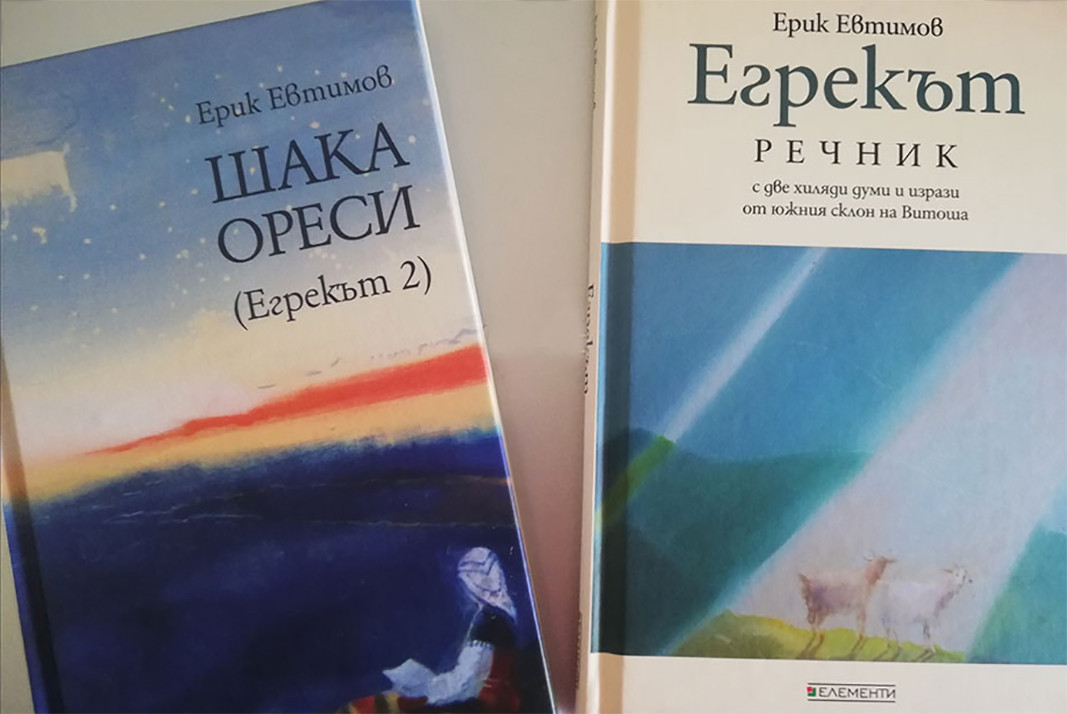A person's true wealth is concentrated in the little things - words, memories, the taste of grandma's jam. The wealth of a nation is the link between generations, the memory and respect on the way to a better world that we can be proud of. This is what doctor of European and International Rail Transport Law, Erik Evtimov, says about his guiding philosophy in life. He has been building a bridge between Bulgaria and Switzerland for more than twenty years now and preserving the Bulgarian spirit.
"A person who has lived in various countries has a different view on things, which in many cases is positive, because it gives you the power and the opportunity to compare and look for the real and important things in life," the professor at the University of Bern says.
The whole year of 2022 in Bulgaria is dedicated to 140 years since the birth of one of the greatest Bulgarian artists - Vladimir Dimitrov-The Master (1.02.1882 - 29.09.1960). Dr. Evtimov is the heir to the Master's landlords in the village of Razhdavitsa near Kyustendil and is a digital ambassador of his art in an international project dedicated to the anniversary.
Family memory and history is the main topic in both of his books - "Egrekat" and "Shaka Oresi", dedicated to the dialects in the villages on the skirts of the Vitosha Mountain, as well as to traditional Bulgarian cuisine. On the eve of November 1 - the Day of Bulgarian Enlighteners, it seems that Erik Evtimov is the modern personification of those important figures for our society, igniting the spark of knowledge, pride and faith in goodness. He himself is of the opinion that each one of us can be enlightener even today.
"The enlightener is in each of us and everyone can collect the small things and pass them on for the benefit of society, which will move forward. My society is the Bulgarian one."
With the help of his mother, Dr. Evtimov collected a kind of a dictionary with 2000 dialect words and expressions from the southern slopes of Vitosha and dedicated it to the ancestors, as well as to their children and grandchildren. The title of the book is "Egrekat", which means a summer herd shed and it presents us with words and expressions, part of the daily life of the old Bulgarians from the villages on both banks of the Struma River, flowing towards the city of Pernik, which is in the lowland.
"The book was born while traveling around Europe, when I realized that besides the official languages there are also dialects that are closely related to certain situations and people. The dialect carries a very strong traditional message. I say this as someone who speaks seven languages. That's what made me collect those words that were born of the pulsation of blood," he adds.
He gives the example of the Canton of Bern, where a dialect is spoken daily and the vocabulary of this dialect includes 650 words. "This enriches communication and preserves the link to the past," the Bulgarian says.
This summer, the second book in the "Shaka Oresi" series was published - Egrekat 2. “Shaka Oresi” means "Handful of Walnuts" and the book is dedicated to his mother and the family matriarchy existing in Bulgarian cultural tradition. Dr. Erik Evtimov also takes us to the kitchen and includes cooking recipes that carry the taste of the past.

"It's all about the Bulgarian family and kinship," Erik Evtimov says. He adds that his memories of his grandmother Lyuba are often associated with the aromas of her dishes, which she prepared very quickly using a few products gathered from her garden.
"Traditional Bulgarian cuisine, compared to other cuisines of the world, differs with this fast and very natural way of cooking. Fresh products are used and a taste that remains very characteristic because of the ingredients used is achieved. One acquires a mythical understanding of cooking as gratitude expressed for the fact that the family has gathered together," Dr. Evtimov points out. He adds that "the mother, housewife and guardian of the home, speaks through the meals she prepares."
Together with the recipes for fried meatballs in rustic style, soups, veal dishes and others, he also described the most important one for him - the one for white cherry jam called belovitsi.

"For me, this has been the symbol of the region of Kyustendil since my childhood. When my family gathered at Grandma Lyuba's house, the white jam was served in small bowls filled with cold water. For me, the fondest memory remains drinking that cold water after eating the jam first.”
Similarly to Proust's Madeleine, the memory of a happy childhood in Bulgaria for Erik Evtimov turns out to be a bowl of white cherry jam.
Interview by: Maria Mira Hristova, BNR-"Hristo Botev"
English: Al. Markov
Photos: BNR, libraryLast September, the all-female choir of the Bulgarian folklore ensemble Shevitsa in Sofia had a surprising new addition: a young man, tattoos and all, the lead singer of a Canadian heavy metal band, who sat neatly next to the last girl on..
Almost every child has the desire - and the ability - to draw or paint. As for talent - sometimes it takes years to be noticed and to receive recognition. Especially if you happen to be growing up in Bulgaria at the dawn of democracy. This is the story..
Tervel Leubomir Boyanov is just 22 but he is one of the young hopefuls of Bulgarian science. He has been nominated for the prestigious TOYP (The Outstanding Young Persons) of Bulgaria. He graduated school long before other people his age, and went..

+359 2 9336 661
